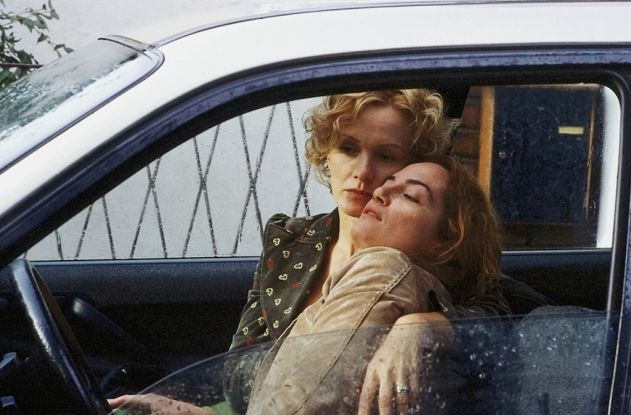”Love and Desire” (2003)

“Love and Desire” (2003), directed by Judith Kennel, is a German drama that delves into the complexities of forbidden love and self-discovery. The narrative centers on Jeanne, a newly appointed English teacher in a small town school, who harbors a concealed truth about her sexuality. Her arrival disrupts the status quo, particularly affecting Puppa, the wife of the school’s principal, Hendrik. Initially, Puppa views Jeanne with suspicion and disdain, but as their interactions deepen, an unexpected and passionate romance blossoms between them, challenging societal norms and personal boundaries.

The film masterfully explores themes of desire, identity, and the consequences of societal judgment. Katja Flint delivers a compelling performance as Puppa, portraying her internal conflict and transformation with nuance, while Natalia Wörner embodies Jeanne’s courage and vulnerability with authenticity. Set against the backdrop of a conservative community, “Love and Desire” invites viewers to reflect on the intricacies of human relationships and the pursuit of true self amidst external pressures.

As Jeanne settles into her new environment, she encounters Puppa, the principal’s wife, with whom she develops an unexpected and intense connection. What begins as tension and initial resentment gradually evolves into a passionate and secret affair that challenges the rigid societal norms of the small town. The film sensitively portrays how personal desire and the search for emotional fulfillment can defy conventional expectations, highlighting the internal conflicts of characters caught between societal duty and the pursuit of love.
 The performances, notably by Natalia Wörner in the role of Jeanne, bring a heartfelt authenticity to the narrative, while the film’s intimate setting and deliberate pacing invite viewers to reflect on the complexities of love and the courage it takes to break free from traditional boundaries. “Love and Desire” stands as a poignant exploration of the transformative power of love, capable of reshaping personal identities against the backdrop of societal pressures and the often unforgiving judgment of a conservative community.
The performances, notably by Natalia Wörner in the role of Jeanne, bring a heartfelt authenticity to the narrative, while the film’s intimate setting and deliberate pacing invite viewers to reflect on the complexities of love and the courage it takes to break free from traditional boundaries. “Love and Desire” stands as a poignant exploration of the transformative power of love, capable of reshaping personal identities against the backdrop of societal pressures and the often unforgiving judgment of a conservative community.











